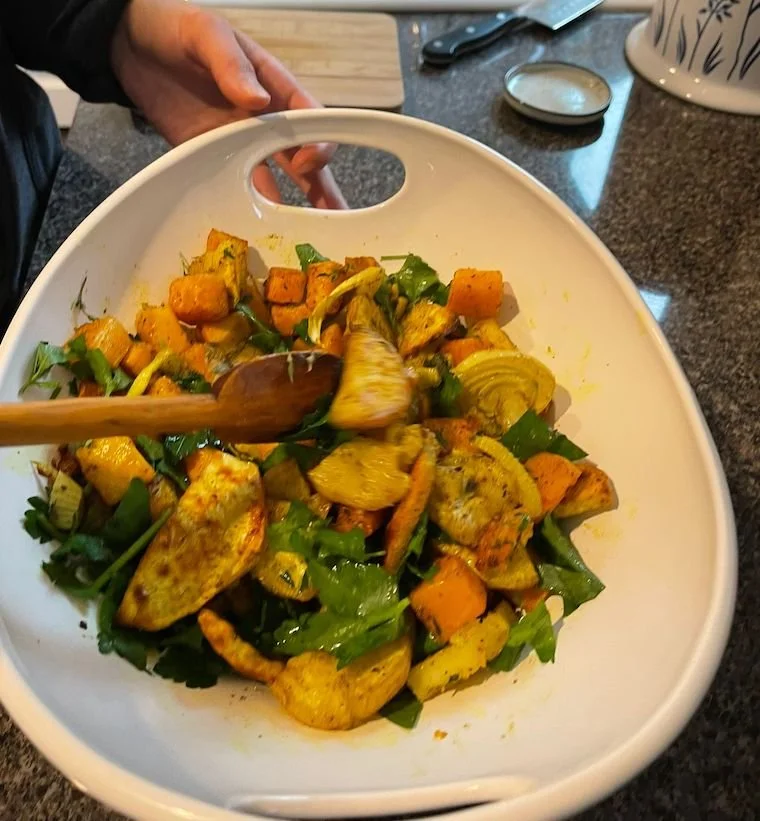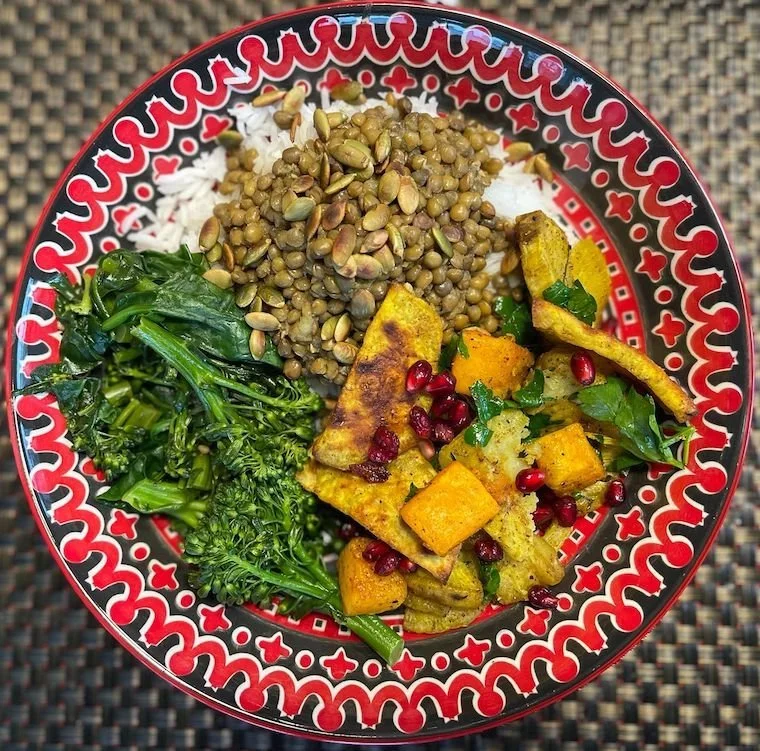Ayurvedic-Inspired Roasted Veggies for A Balanced Winter
Dec 2, 2021 | Written by Leticia Padmasri
Winter is so still. The water begins to freeze in the lakes, animals hibernate, birds fly south. I take slow deep breaths, being open to receive the gifts that the season of low light, slumber, and dormancy offer me. Yoga and Ayurveda help me to appreciate, rather than resist, the darkness and the quiet. My haven then is meditation, hiking with our pooch Mel, and turning on the oven!
Cooking in the winter is so gratifying. The winter chill is broken by the oven’s warmth, which warms my bones while the aroma and heat spread throughout the house…
Winter According to Ayurveda
Every season has the potential to either strengthen or hamper our sense of well-being. That’s exactly why Ayurveda recommends seasonal routines. We adapt our diet and lifestyle to better accommodate the changing seasons. Understanding each season’s unique qualities can help us counterbalance the potential for seasonally induced imbalances.
Early winter (late November to mid-January) has qualities that make it a more Vata season – dry, cold, and light. As the rain and snow increase, the cold and dampness do as well, increasing Kapha qualities – wet, colder, and heavy. Of course, you see these qualities interweaving throughout the entire winter season, and our age, constitution, and environment can influence them too. For example, as the temperature drops further, you may pump the heat up, which will increase dryness, and consequently Vata dosha.
Being aware of these qualities will guide you into a conscious lifestyle and dietary choices as you apply the fundamental principle of Ayurveda: like attracts like and the opposite balances.
Here I want to share with you a recipe for roasted veggies that you can adjust considering the environmental changes at your location.
Early winter, we look for veggies to stay more grounded, countering the Vata qualities. So the recipe below can be made with sweet potatoes and winter squashes, for example. That’s the version I am sharing with you since I am writing this in early winter… As we go deep into the winter, you will not need veggies that are as heavy as you did earlier in the season. Lighter root veggies such as turnips, parsnips, and rutabaga can fill you up without weighing you down.
Fennel-Roasted Root Veggies
(Serves 2-3)
INGREDIENTS:
3 lbs veggies: Japanese sweet potato and butternut squash
1 fresh fennel bulb
1 tsp coriander seeds
1 tsp cumin seeds
1 tsp ground turmeric
¼ tsp salt
½ tsp black pepper
3 tbsp ghee, melted (use less oil at the second half of the winter unless you feel very dry)
Chopped parsley and thyme, and pomegranate seeds for garnish
PREPARATION:
Heat oven to 400°.
In a medium frying pan over medium heat, dry-roast the coriander and cumin seeds, stirring constantly, until fragrant, 2-3 minutes. Remove seeds from the pan and let cool, 5 minutes.
In a spice grinder or mortar and pestle, grind the roasted seeds to a coarse powder.
In a bowl, combine the veggies and add the ground seeds, salt, turmeric, and black pepper, and ghee. Toss until evenly coated.
On baking sheets, spread the veggies. Make sure to leave a little space between each cube – this way, the veggies will get nicely crisp and brown in the oven.
Bake, flipping halfway through, for 30-35 minutes or until golden brown around the edges.
Garnish with the herbs and pomegranate
Serve with grains, legumes, and greens to make it a complete meal!
May the wisdom of Ayurveda brighten your winter!
Bom apetite!



